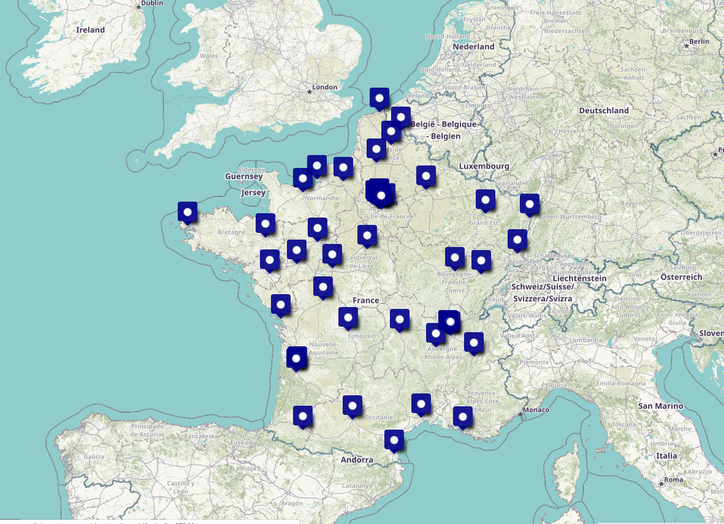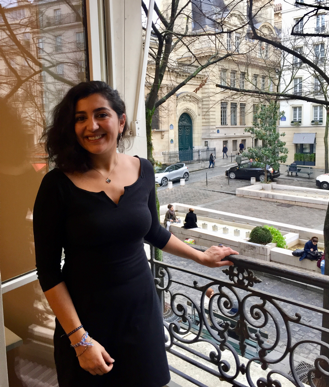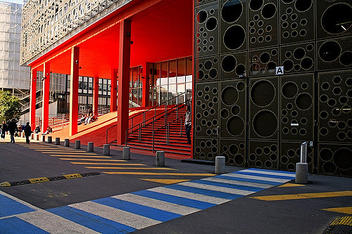Continue or resume your studies during your exile in France

Enrolment process, French lessons, recognition of diplomas, tuition fees, “gateway” programmes... Various facilities and mechanisms have been introduced for migrant students to help them access French higher education.
Access French higher education
The steps to take will depend on your status (refugee, stateless, beneficiary of subsidiary protection or asylum seeker) and the type of training considered (1st year of an undergraduate degree, selective programme of study or 2nd year of an undergraduate degree and higher).
You have refugee or stateless status or are a beneficiary of subsidiary protection
You would like to access:
- 1st year of an undergraduate degree (Licence, L1): you can contact the institution directly to apply.
- a selective programme of studies (BTS, DUT, CPGE)*: please apply through the platform Parcoursup
- 2nd or 3rd year of an undergraduate degree, a Master’s degree (Master 1 or Master 2) or a college: you can contact the institution directly to apply.
* BTS = Brevet de Technicien Supérieur (Advanced Technician Certificate); DUT = Diplôme Universitaire Technologique (Technological University Diploma); CPGE = Classe Préparatoire aux Grandes Écoles (Preparatory Studies for the Grandes Écoles). These are short 2-year studies available to those who have a secondary school diploma.
You have asylum seeker status
You would like to access:
- 1st year of an undergraduate degree (Licence, L1): you must apply through the DAP (Demande d’Admission Préalable, Preliminary Admission Application) procedure.
Do you live in France, do not have French nationality and do not hold a French secondary school diploma? You must follow the DAP verte (green DAP) procedure. If you live in a different country, you will need to follow the DAP blanche (white DAP) procedure. - a selective programme of studies (BTS, DUT, CPGE)*: please apply through the platform Parcoursup
- 2nd or 3rd year of an undergraduate degree, Master’s degree (Master 1 or Master 2) or a college: you can contact the institution directly to apply.
- a national school of architecture, any level: you must apply through the DAP jaune (yellow DAP) procedure.
* BTS = Brevet de Technicien Supérieur (Advanced Technician Certificate); DUT = Diplôme Universitaire Technologique (Technological University Diploma); CPGE = Classe Préparatoire aux Grandes Écoles (Preparatory Studies for the Grandes Écoles). These are short 2-year studies available to those who have a secondary school diploma.
Timetable of procedures
Some procedures have a strict timetable that must be adhered to.
Please find below the DAP and Parcoursup deadlines for applying to French higher education institutions in 2022/23:
DAP (Demande d’admission préalable, Preliminary admission application)
- Registrations open on 1st October 2023
- Registrations close on 15 December 2023
Your application will be examined at the same time by the 3 universities you have requested.
- University response and proposals for acceptance : before 30 April 2024
If it occurs, universities will share with you exemptions from which you may benefit.
- Student response : before 31 May 2024
If you have received several acceptance proposals, you will have to make a choice.
Attention, if you do not answer before May 15, the absence of answer will be condidered as a refusal.
Parcoursup
Discovery of courses available: From 20 December 2023
Registration and indication of preferences: 20 January - 14 March 2024 inclusive
Confirmation of preferences: until 3 April 2024 inclusive
To apply for available courses without going through these two procedures, please contact the institution in question directly as soon as possible.
In any case, in order to access French higher education, you must hold a diploma or certificate that gives access to higher education in the country in which you obtained it.
Tuition fees
If you have refugee status or are a beneficiary of subsidiary protection, the French State will cover most of the cost of your training in a public institution. Differential tuition fees that that will be introduced at the start of the 2019 academic year do not apply to you. This means that you pay the same tuition fees as French and EU students.
To find out more, visit our page dedicated to the cost of higher education studies in France.
According to the French Code of Education, refugees, asylum seekers and beneficiaries of subsidiary protection can also be exempt from paying tuition fees. The decision is made by the institution.
The CVEC (Contribution Vie Etudiante et de Campus, Contribution to Student and Campus Life)
The CVEC is a contribution requested from students who enrol in a higher education institution. Its aim is to improve reception conditions and offer social, health, cultural and sporting support to students.
If you have refugee, stateless or asylum seeker status or are a beneficiary of subsidiary protection, you do not have to pay the CVEC. However, you must obtain an exemption certificate before enrolling at your chosen institution. The exemption certificate can be obtained online:
- first by creating an account on the website messervices.etudiant.gouv.fr
- followed by logging onto the CVEC website cvec.etudiant.gouv.fr.
To find out more, visit our page dedicated to the CVEC (Contribution Vie Etudiante et de Campus).
Certifying your level of French
Some institutions require students to provide a French language certification to access courses held in French. As a general rule, your level of French must be equivalent to B2 level. A certification can be obtained by passing one of these tests or holding one of these diplomas:
- The TCF (test de connaissance du français) is the official test of the French Ministry of Education. The test is developed by CIEP (Centre international d’études pédagogiques, International Centre for Studies in Education) and some parts may be taken online or remotely in certain countries. TCF scores are valid for two years.
- The TEF (Test d'évaluation du français) is an international benchmark tool created and distributed by the Paris Chamber of Commerce and Industry. It measures your level of knowledge and skills in French on a scale from 0 to 7. It is available electronically and the results are shown immediately. You can sit the TEF as many times as you like.
- The DELF (Diplôme d’études en langue française) and DALF (Diplôme approfondi de langue française) are official qualifications awarded by the French Ministry of Education. They consist of six independent diplomas that certify proficiency in the four language skills. They are valid indefinitely. Unlike the tests, DELF and DALF diplomas are acquired for life.
Some foreign students, on account of their nationality, are exempt from the requirement to certify their level of French. Please consult the list on the website Welcome refugees.
In any case, please check with your chosen institution whether they require a French language certificate. Not all do.
Learn French
FLE (Français Langue Etrangère) courses
To learn French as a foreign student, you must attend FLE (Français Langue Etrangère, French as a Foreign Language) courses. To ensure that you are learning French in good conditions, choose centres awarded the FLE quality label. This FLE centre accreditation guarantees high-quality language training. You can find a list of all these centres in the catalogue of short programmes and summer schools published by Campus France.
Our recommendations for learning French online
- To learn about French culture and language, watch TV5 Monde, the international French-language channel. Its platform “Apprendre” (“Learn”) contains interactive exercises suitable for all levels to learn French.
- RFI Savoirs, the French-language radio station, offers exercises, files and programmes to learn and teach French.
- The Association Française pour la Formation des Adultes (Association for the Education of Adults) offers MOOCs (Massive Online Open Courses), including one French as a Foreign Language (FLE) course to provide the basics of French language for beginners.
- OLS (Online Linguistic Support) is an online platform originally developed for students participating in the Erasmus+ programme. It can be used to assess your knowledge and continue learning a language. OLS is free and available in 24 languages.
- The smartphone app ANKIApp offers free exercises to learn a language of your choice.
- Many Alliances Françaises offer online courses to learn French. Visit the website of the Alliance to find out more.
Other recommendations designed specifically for migrants
- The FL@ app was created by the association France Langue d'Accueil to help people learn French using their mobile phone, but also find services and useful places in Paris.
- The vocabulary booklet “Bienvenue chez toi” (“Welcome to your home”): around a thousand words and expressions useful in everyday life, in French, English, Arabic and Farsi.
Return to studies programmes for migrant students
Integration pathways supported by the AIMES programme of the Agence Universitaire de la Francophonie (Francophonie University Association)
Around fifty universities offer schemes for learning French and support in resuming studies. The aim is to give students in exile the knowledge and level of French necessary to access university courses and thereby help them integrate into social and professional life.
More information on the map:

Read the testimonial of Nour, a female Syrian student who arrived in France in 2016. She was able to resume her studies by taking part in the “Passerelle” (“Gateway”) programme offered by the Université Paris-Est Créteil and supported by the AIMES programme. Today, she has validated her Syrian undergraduate degree and obtained a B2 level in French. She has been admitted into a Master’s degree in Public Policies at the Université Paris Est Créteil. We wish her the best of luck!

Programmes offered by r-e-s-o-m-e
r-e-s-o-m-e (Réseau d'Etudes Supérieures et Orientation des Migrants Exilés, Network of Higher Education Studies and Guidance for Exiled Migrants) is a collective of volunteers that seeks to promote access to higher education and provide guidance for all students exiles. The actions undertaken by r-e-s-o-m-e have helped open a number of return to studies programmes within institutions and schools. These are transition programmes that were designed to prepare migrant students to access training leading to a diploma in French higher education. The list of 20 programmes (spread across Paris, Grenoble, Lyon, Dijon and Poitiers) and the eligibility criteria are available on r-e-s-o-m-e’s website.
University diploma "RESPE" (Retour aux Etudes Supérieures des Personnes Exilées, Return to Higher Education for Exiles)
Sorbonne University has introduced, from the start of the 2018/2019 academic year, a university diploma (DU, diplôme universitaire) for exiled persons whose studies have been interrupted. The curriculum is divided into courses in French as a Foreign Language (FLE), methodology and general culture. Refresher courses in science (biology, chemistry, maths, physics) and humanities (English, art, history and geography, literature, philosophy) are also integrated into the programme. The aim is for persons in exile to resume studies in French higher education and obtain a B2 level in French.
The “RESPE” university diploma is available to people with a B1 level in French and an equivalent secondary school diploma. The programme lasts 1 year. You can apply online.
A “Gateway” university diploma
Thanks to the actions of a network of French institutions, the MEnS (Migrants dans l'Enseignement Supérieur, Migrants in Higher Education), a university diploma for student exiles is offered since the academic year 2019/2020. It is available in every university willing to offer it and authorised to do so by the French Ministry for Higher Education, Research and Innovation. This diploma is a “gateway” to resuming studies in French higher education. It opens access to scholarships on social grounds.
Recognition of diplomas
The ENIC-NARIC France centre is the organisation to contact to receive a document certifying the level of studies that you have obtained in your country.
It is not a question of equivalence but a statement of comparability between the diploma you obtained in your country and the French system. This document may be requested by a higher education institution and will help you put together your application to access training.
The ENIC-NARIC France centre has introduced a specific procedure for the recognition of diplomas held by refugees and asylum seekers. It is easier, quicker and free of charge. Requests by refugee students are processed as a priority.
You can apply for the certificate online.
Related contents
Recommended items

























































